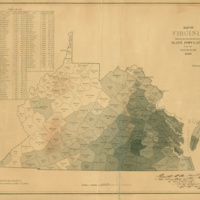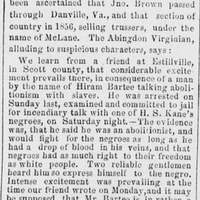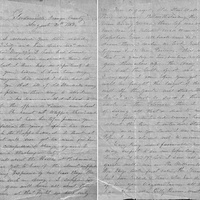Civil War and Reconstruction
1850-1877

The Civil War was undoubtedly one of the most important events in American history. The war challenged not only the issue of slavery, but the also the balance of federal versus state powers and the power of constitutional government. In the end, not only did the war preserve the Union as Abraham Lincoln had spoken of, but it also freed nearly four million African Americans from enslavement. The war also highlighted stark differences in regions of the country. These differences ranged from political to religious to economic. The war saw an increase in battlefield news coverage and photography that visually presented military carnage in a way not seen before. The Civil War's outcome brought the first assassination of an American president.
During the postwar period known as Reconstruction the nation faced the challenges of readmitting formerly Confederate southern states back into the Union as well as integrating African Americans into the political, economic, and social fabric of the country. The 13th, 14th, and 15th Amendments were aimed towards providing full equality for African Americans, but faced opposition on many levels. Despite headway, the North and the South both had strong objections to Radical Reconstruction and full social and racial democratization. Many Americans opposed the idea of redistributing wealth and were still in favor of strong local rights and government. In some cases, Reconstruction increased the racial divide, giving rise to groups such as the Ku Klux Klan and spurring violence against African Americans.
Learn more in the National History Content Standards.
Recently added items
Hiram Bartee, Indictment for Abolitionism, Scott County, 1859
In October 1859, white abolitionist John Brown led an armed raid on the federal arsenal at Harper's Ferry, Virginia (now West Virginia), in an attempt to overthrow the system of slavery. Sixteen people died in the raid. Brown and six of his…
Lesson Plan – Citizenship During and After the Reconstruction Era
Black Americans understood the meaning of citizenship and the possibilities afforded by the prospect of emancipation long before the end of the Civil War. Among their demands for equality was the right to participate in the political process as…
Letter from a Confederate Soldier, 1862
Virginia was a critical battleground during the Civil War. Not only was Richmond the seat of the Confederate government, but the Commonwealth was also the site of some of the war’s major battles. Tens of thousands of Virginians fought in the Civil…
Requisition Order to Washington County Slaveholders, Abingdon Virginian, Feb. 20, 1863
From the beginning of the Civil War, the Confederate government attempted to requisition needed goods and services from private citizens. In March 1863, the Confederate Congress passed an Impressment Act that allowed them to requisition crops,…




